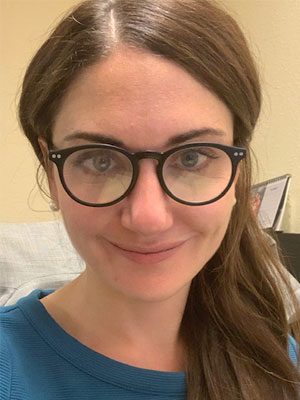Berkeley Public Health alumna profile: Mary Bullis

- Interdisciplinary MPH 2020, Online MPH Program
- Home state: Vermont
- Currently lives: Between Alaska and Vermont
- Preferred pronouns: she/her/hers
Why did you choose the online program, as opposed to a traditional program?
I lived in Alaska and wanted to remain at my job as a public defender while I did the program. The online education allowed me to pursue my educational goals and remain rooted in my employment and home at the time.
What sparked your interest in public health?
I was a public defender for approximately 8 years. Very quickly in my career I realized that the solutions to the problems that many of my clients faced existed outside of the criminal justice and child welfare systems. I wanted to learn how to help my clients outside of the litigation/trial lens.
What is your previous work and educational history and how did your degree fit into that?
I graduated from St. Michael’s College with a degree in English literature, and also have a JD from the University of Maine School of Law. I waited tables to support myself throughout my education. After law school I was brought to Alaska through a judicial clerkship in Anchorage, Alaska. My career has mostly been in public defense work. I decided to pursue an MPH to help my clients on a policy level.
Can you tell us about your career arc since graduating from the Online MPH program?
I remained at my job for about a year after graduation from Berkeley. I used my MPH to help design a bail questionnaire to advocate for people’s release from incarceration during the pandemic. I had a child in May of 2021. Due to childcare issues I decided to take a pause from litigation and trial work. I took a remote job with the Central Council of Tlingit & Haida Indian Tribes as an attorney for their Community Advocacy Initiative with a strong focus on policy work. I am also helping with program building as well.
How has your degree from Berkeley Public Health helped you achieve your career goals?
As a public defender I saw how the criminal justice and child welfare systems disproportionately affected Native Alaskans. Once involvement with these systems have been triggered, it is harder to fight the racial disparities. My current position has a strong focus on fighting these disparities through policy. I have always wanted to work for a tribal government, and my MPH is certainly a huge part of why this has transpired.
How did your time at Berkeley Public Health challenge you, and how have you applied what you learned?
I have always been someone more oriented towards writing and someone who is not so great with technology. Math and science were also never my strong suit. While I did have an interdisciplinary/policy focus, I also made myself take all the epidemiology and GIS classes available through the program. These classes were a huge challenge for me, but I think it was invaluable for me to learn coding and GIS basics. Looking at statistics, and using statistics, in my legal career provided a fresh insight into my trial work, especially during the time of COVID.
What were the most transformational parts of your experience at Berkeley Public Health? How did those formative moments help you decide on your current path?
I really enjoyed the on-campus visit my first year. (I missed my second year-visit due to COVID, which was virtual!) It was so refreshing to meet people from the various disciplines this program attracts. To me the program represented the heart of public health and how public health really touches everything. I was in one group with three strong and motivated women–one who was starting medical school in her forties. Learning coding/R had me in tears almost every week. I think that experience also reminded me that I was learning a new skill set. I was proud of myself when I got through it, even if I didn’t have an A in the class.